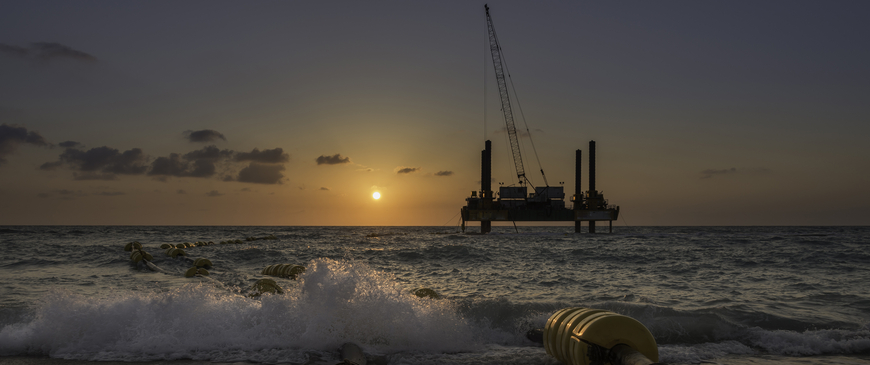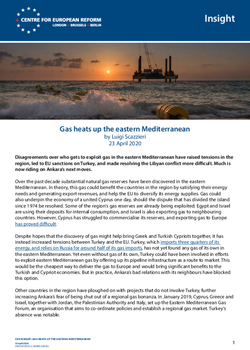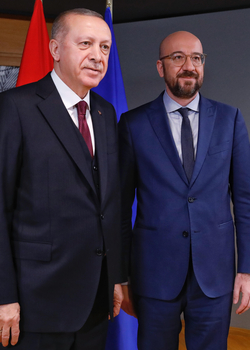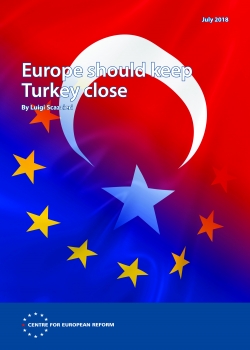
Gas heats up the eastern Mediterranean
Disagreements over who gets to exploit gas in the eastern Mediterranean have raised tensions in the region, led to EU sanctions on Turkey, and made resolving the Libyan conflict more difficult. Much is now riding on Ankara’s next moves.
Over the past decade substantial natural gas reserves have been discovered in the eastern Mediterranean. In theory, this gas could benefit the countries in the region by satisfying their energy needs and generating export revenues, and help the EU to diversify its energy supplies. Gas could also underpin the economy of a united Cyprus one day, should the dispute that has divided the island since 1974 be resolved. Some of the region’s gas reserves are already being exploited: Egypt and Israel are using their deposits for internal consumption, and Israel is also exporting gas to neighbouring countries. However, Cyprus has struggled to commercialise its reserves, and exporting gas to Europe has proved difficult.
Despite hopes that the discovery of gas might help bring Greek and Turkish Cypriots together, it has instead increased tensions between Turkey and the EU. Turkey, which imports three quarters of its energy, and relies on Russia for around half of its gas imports, has not yet found any gas of its own in the eastern Mediterranean. Yet even without gas of its own, Turkey could have been involved in efforts to exploit eastern Mediterranean gas by offering up its pipeline infrastructure as a route to market. This would be the cheapest way to deliver the gas to Europe and would bring significant benefits to the Turkish and Cypriot economies. But in practice, Ankara’s bad relations with its neighbours have blocked this option.
Other countries in the region have ploughed on with projects that do not involve Turkey, further increasing Ankara’s fear of being shut out of a regional gas bonanza. In January 2019, Cyprus, Greece and Israel, together with Jordan, the Palestinian Authority and Italy, set up the Eastern Mediterranean Gas Forum, an organisation that aims to co-ordinate policies and establish a regional gas market. Turkey’s absence was notable.
Turkey has sought to obstruct efforts to develop and commercialise Cypriot gas.
As more gas has been discovered near Cyprus, the country’s authorities have handed out more exploration licenses to companies. However, Turkey has sought to obstruct efforts to develop and commercialise Cypriot gas. It has deployed its navy to disrupt exploration efforts, and dispatched its own ships to search for gas in the disputed region. “Nothing at all can be done in the Mediterranean without Turkey,” the country’s foreign minister, Mevlüt Çavuşoğlu told a business conference in February.
Turkey does not recognise the Republic of Cyprus and argues that citizens of the Turkish Republic of Northern Cyprus, a state that only Turkey recognises, have the right to a share of the island’s gas resources. Furthermore, Turkey also argues that Cyprus should not embark on efforts to commercialise offshore gas deposits until there is a political resolution to the country’s long-running dispute. Separately, Turkey also claims as its own areas that the EU recognises as part of Cyprus’ Exclusive Economic Zone (EEZ) – the waters that a coastal state has an exclusive right to exploit. Turkey is not a signatory to the UN Convention on the Law of the Sea (UNCLOS), and argues EEZs should be based on continental shelves, with islands only having right to a very narrow EEZ of 12 nautical miles.
The shared desire to develop and exploit gas in the region, and to counter Turkey’s growing assertiveness, has led to the consolidation of an informal alliance between Cyprus, Egypt, Greece and Israel. Cyprus and Greece have had a tense relationship with Turkey for decades, and feel threatened by Ankara’s actions in the Aegean and eastern Mediterranean, which have included incursions into Greek airspace. Meanwhile, Israel and Turkey are once again at loggerheads: Israel is perturbed by Ankara’s actions in the eastern Mediterranean, and also accuses it of abetting Hamas. Relations between Cairo and Ankara are very bad: the two are ideological rivals as a result of Turkey’s support for the Muslim Brotherhood and Cairo’s aversion to it, and they are backing different sides in the Libyan conflict.
The burgeoning partnership between Cyprus, Greece and Israel has also led to closer political, economic and military ties.
The burgeoning partnership between Cyprus, Greece and Israel has also led to closer political, economic and military ties, with the three countries regularly carrying out joint military exercises. The US, disillusioned with Turkey, has played a significant role in nurturing this emerging energy and security alliance as the linchpin of a new eastern Mediterranean strategy. In December 2019, Congress passed legislation granting US support to energy and military co-operation between Greece, Cyprus and Israel. The legislation repeals the 1987 US arms embargo on Cyprus, and paves the way for greater military assistance to Cyprus and Greece. Italy and France, concerned by Turkey’s actions in the eastern Mediterranean, have also increased their support to Cyprus. In December, they carried out joint naval exercises with Cyprus, and France is also helping Cyprus upgrade a naval base to host larger ships.
Tensions in the region have risen sharply in recent months. In late November 2019, Libya’s UN-recognised Government of National Accord (GNA) in Tripoli signed a maritime agreement with Turkey, in exchange for the latter providing it with assistance in its struggle against military commander Khalifa Haftar. The Turkey-Libya agreement sets a maritime boundary between the two which does not take into account Crete, overlapping with Greece’s EEZ. The Turkey-Libya agreement provided a spur for Cyprus, Greece and Israel to strike a deal in January 2020 to build a 1,900 kilometre pipeline to bring gas from deposits in Israel and Cyprus to Greece and Italy, the ‘East Med pipeline’. The pipeline, which is expected to cost between $6 billion and $7 billion, is scheduled to be completed by 2025, and could bring 10 billion cubic metres per year to the EU – around 4 per cent of its annual gas consumption.
Cypriot gas has become one of the main sources of tension between the EU and Turkey.
Cypriot gas has become one of the main sources of tension between the EU and Turkey. While the EU and Turkey disagree over many issues, Turkey’s actions in the eastern Mediterranean are particularly consequential because they directly affect an EU member-state. The EU argues that Cyprus is entitled to develop its own gas reserves, and that any disputes with Turkey should be resolved through negotiations. After repeatedly condemning Turkey’s gas exploration in the eastern Mediterranean, in November 2019 European leaders agreed on a framework to sanction Ankara’s “continued and new illegal drilling activities” in areas that the EU recognises as Cyprus’ EEZ. In February 2020, the EU agreed to impose asset freezes and travel bans on several officials from Turkey’s state-owned Turkish Petroleum Corporation.
Tensions are likely to continue to rise: Turkey is intent on defending what it sees as its interests, even if this means alienating most countries in the region. Meanwhile, Cyprus, Egypt, Greece and Israel want to deepen their energy co-operation and counter Turkey’s actions. If Turkey continues to clash with Cyprus and Greece, the EU will probably impose additional sanctions on Turkey. More sanctions are unlikely to change Turkish behaviour, but they will further sour EU-Turkey relations, making even transactional co-operation on policy areas such as migration much more challenging. While military conflict remains unlikely, Turkey’s deal with the GNA has entangled the gas dispute with the Libyan war, making peace harder to achieve and fuelling escalation. Turkey’s support for the GNA has meant that many member-states are unwilling to pressure Haftar and his backers to accept a ceasefire. Greece, for example, has sought to build closer links to Haftar to counter Turkey’s influence.
At the same time, growing tensions in the eastern Mediterranean will also complicate the development of Cypriot gas. Turkey’s military presence will deter foreign companies from carrying out further exploration, and from constructing the East Med pipeline. The project already faces large difficulties. From a technical point of view, building a pipeline is challenging because of the depth at which the pipes have to be laid on the seabed. Moreover, even prior to the coronavirus pandemic, the economic viability of the project was questionable, with global demand for gas declining and prices low. The pandemic will further depress demand and lower prices, making it even harder to raise capital.
Despite its potential role in diversifying European energy supplies, as a carbon producing project, the pipeline is unlikely to benefit from significant EU funding in the new policy context of the Union’s embryonic Green Deal. Finally, some of the governments involved have doubts about the plan. Italy is not fully convinced by the project, with the ruling 5 Star Movement in particular being sceptical. Israel could seek alternative export routes for its gas, bypassing Cyprus by pumping its gas to Egypt for export via LNG terminals, or by constructing its own LNG facilities. Cyprus itself is considering exporting its gas through Egypt, and has already signed an agreement with Cairo to build a pipeline.
Commercial considerations could help take some sting out of the gas dispute by impeding further development efforts.
Commercial considerations could help take some sting out of the gas dispute by impeding further development efforts – some companies have already put exploration activities on hold. However, whether a dangerous gas-fuelled escalation can be avoided depends mainly on Turkey’s next moves. If Ankara continues on its current course, tensions are likely to rise. But Turkey might be tempted to de-escalate if its relations with Russia deteriorate as a result of renewed fighting in Syria, or if the Turkish economy suffers a heavy economic blow as a result of the COVID-19 pandemic. In both cases, Ankara would have incentives to decrease tensions with the EU and the US, and winding down its activities in the eastern Mediterranean would be one of the easier ways of doing so.
In the meantime, Europe needs to find a way of managing its relationship with Turkey, minimising conflict and maintaining as much co-operation as possible. While Turkey’s actions in the eastern Mediterranean are deeply concerning to the EU, in other areas the EU and Turkey have common interests. For example, it is in the EU’s interest to reach a more solid migration co-operation agreement with Ankara, offering it continued financial support in helping to care for the nearly 4 million refugees it is hosting. Meanwhile, if Russia and Syria succeed in pushing Turkey out of Syria, this will lead to millions more refugees streaming into Turkey and making their way to Europe. It is therefore in Europe’s interest to exert pressure on Russia to de-escalate, and work towards a stable ceasefire. In Libya too, the EU will need to work with Turkey to achieve a ceasefire and a degree of stability.
Europe needs to find a way of managing its relationship with Turkey, minimising conflict and maintaining as much co-operation as possible.
Co-operation on one issue may generate goodwill in other areas, and ultimately make it easier for Europe and Turkey to address their differences in the eastern Mediterranean. And a substantial reduction in tensions could pave the way for restarting the Cyprus re-unification talks that collapsed in the summer of 2017. Progress towards a solution to that decades-long dispute would make it easier to begin talks on maritime boundaries in the eastern Mediterranean, and eventually exploit gas in a manner that benefits the region as a whole, and Europe too.
Luigi Scazzieri is a research fellow at the Centre for European Reform.




Comments
Add new comment